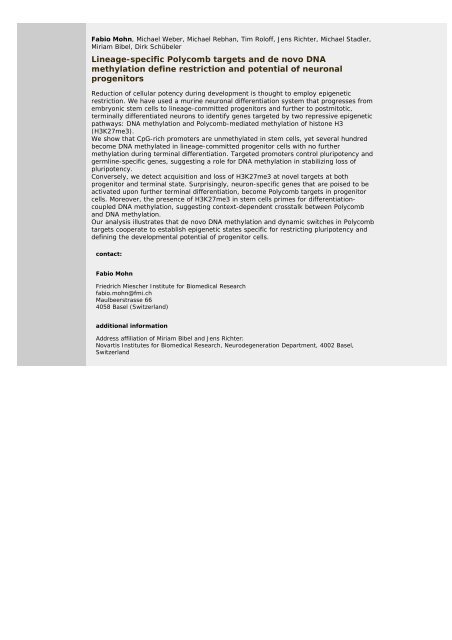Abstracts (poster) - Wissenschaft Online
Abstracts (poster) - Wissenschaft Online
Abstracts (poster) - Wissenschaft Online
You also want an ePaper? Increase the reach of your titles
YUMPU automatically turns print PDFs into web optimized ePapers that Google loves.
Fabio Mohn, Michael Weber, Michael Rebhan, Tim Roloff, Jens Richter, Michael Stadler,<br />
Miriam Bibel, Dirk Schübeler<br />
Lineage-specific Polycomb targets and de novo DNA<br />
methylation define restriction and potential of neuronal<br />
progenitors<br />
Reduction of cellular potency during development is thought to employ epigenetic<br />
restriction. We have used a murine neuronal differentiation system that progresses from<br />
embryonic stem cells to lineage-committed progenitors and further to postmitotic,<br />
terminally differentiated neurons to identify genes targeted by two repressive epigenetic<br />
pathways: DNA methylation and Polycomb-mediated methylation of histone H3<br />
(H3K27me3).<br />
We show that CpG-rich promoters are unmethylated in stem cells, yet several hundred<br />
become DNA methylated in lineage-committed progenitor cells with no further<br />
methylation during terminal differentiation. Targeted promoters control pluripotency and<br />
germline-specific genes, suggesting a role for DNA methylation in stabilizing loss of<br />
pluripotency.<br />
Conversely, we detect acquisition and loss of H3K27me3 at novel targets at both<br />
progenitor and terminal state. Surprisingly, neuron-specific genes that are poised to be<br />
activated upon further terminal differentiation, become Polycomb targets in progenitor<br />
cells. Moreover, the presence of H3K27me3 in stem cells primes for differentiationcoupled<br />
DNA methylation, suggesting context-dependent crosstalk between Polycomb<br />
and DNA methylation.<br />
Our analysis illustrates that de novo DNA methylation and dynamic switches in Polycomb<br />
targets cooperate to establish epigenetic states specific for restricting pluripotency and<br />
defining the developmental potential of progenitor cells.<br />
contact:<br />
Fabio Mohn<br />
Friedrich Miescher Institute for Biomedical Research<br />
fabio.mohn@fmi.ch<br />
Maulbeerstrasse 66<br />
4058 Basel (Switzerland)<br />
additional information<br />
Address affiliation of Miriam Bibel and Jens Richter:<br />
Novartis Institutes for Biomedical Research, Neurodegeneration Department, 4002 Basel,<br />
Switzerland

















